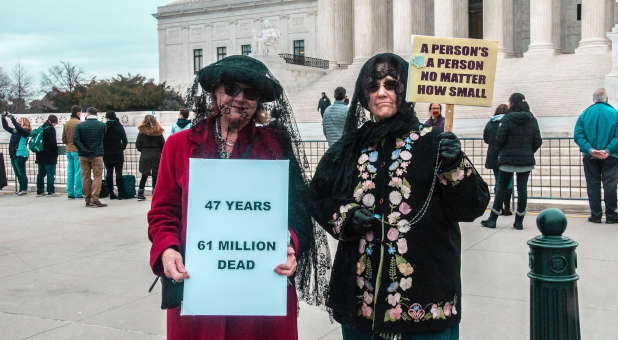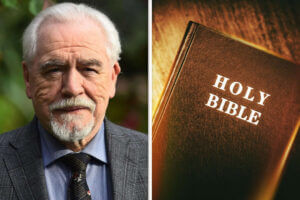While the pro-life position is widely associated with Bible-believing Christians, there are actually professing Christians who identify as pro-choice. In fact, one of my pro-life colleagues was speaking at a church in Michigan when, to his shock, he learned that the pastor had recently taken up an offering to help one of the young ladies in the church get an abortion.
How can this be?
A pro-life colleague in Charlotte, North Carolina, told me that he knew an abortion doctor in the city who gave a tenth of her earnings to her local church. In her mind, she was doing God’s work.
In that same spirit, Breitbart reports that, “Several left-wing, pro-abortion activist groups led by so-called ‘clergy’ are ramping up their efforts to make sure women can abort their unborn children, including transporting them to states where abortionists are still operating.”
In the words of Katie Zeh, a pastor and CEO of the Religious Coalition for Reproductive Choice, “It’s so central to our faith to care for people, so it’s no surprise that clergy [prior to Roe v. Wade] were part of the group helping people get abortion care.”
When we look to the Scriptures, it is clear that the Bible describes the humanity of the baby in the womb. This is a child with potential life and destiny ahead, not a clump of cells. So, the pro-life position is easily deduced from the pages of the Bible.
But when we look to writings of the early church leaders, their condemnation is even more direct and forceful. And remember: this was without the visual evidence of ultrasounds and without today’s massive improvements in fetal viability. Still, they recognized abortion for the evil that it is.
One of the earliest church writings from outside the New Testament is the Didache, also known as “The Teaching of the Twelve,” as if going back directly to the twelve apostles.
It states, “The second commandment of the teaching: You shall not murder. You shall not commit adultery. You shall not seduce boys. You shall not commit fornication. You shall not steal. You shall not practice magic. You shall not use potions. You shall not procure [an] abortion, nor destroy a newborn child” (Didache 2:1–2).
Both abortion and infanticide were prohibited, regardless of what the rest of the culture practiced. Such was the counter-culture mentality of the church, being transformed by the Word rather than conformed to the world (see Romans 12:1-2).
Another important source from the early church is the Letter of Barnabas. It mirrors the Didache, stating, “Thou shalt not slay the child by procuring abortion; nor, again, shalt thou destroy it after it is born” (Letter of Barnabas 19). It’s a baby inside the womb and a baby outside the womb.
Writing toward the end of the second century, Tertullian said, “In our case, a murder being once for all forbidden, we may not destroy even the fetus in the womb, while as yet the human being derives blood from the other parts of the body for its sustenance. To hinder a birth is merely a speedier man-killing; nor does it matter whether you take away a life that is born, or destroy one that is coming to birth. That is a man which is going to be one; you have the fruit already in its seed” (Apology 9:8).
Skipping ahead 200 more years, to the end of the fourth century, Jerome wrote, “Some go so far as to take potions, that they may insure barrenness, and thus murder human beings almost before their conception. Some, when they find themselves with child through their sin, use drugs to procure abortion, and when, as often happens, they die with their offspring, they enter the lower world laden with the guilt not only of adultery against Christ but also of suicide and child murder” (Letters 22:13).
And this is just a sampling of the statements of these church leaders, for whom abortion was a deeply sinful practice. In the words of John Chrysostom, also in the late fourth century, abortion is “murder before the birth.”
In fact, David Bercot, in A Dictionary of Early Christian Beliefs, listed more than 20 relevant quotes under the heading of Abortion/Infanticide, indicating how these church leaders saw abortion and infanticide as two sides of the same coin. (Note that infanticide was widely practiced in the ancient world, with parents leaving unwanted infants outdoors to be killed by animals or nature.) The amount of citations gathered by Bercot also points to the importance of the topic for these Christian leaders, the earliest of whom were the disciples of the apostles.
For those of you reading this article who have had abortions or participated in an abortion, it is understandable that these quotations sting deeply. At the same time, there is mercy and forgiveness and healing and restoration at the cross. And if you confess your sin to God and cry out for mercy and grace, the blood of Jesus will cleanse you — thoroughly, completely, and eternally. And this includes the sin of abortion.
And to every Christian leader who claims to find biblical support for your abortion-supporting position, I leave you with the words of Jesus: “See that you do not despise one of these little ones. For I tell you that their angels in heaven always see the face of my Father in heaven” (Matt. 18:10).
When those babies in the womb—the ultimate “little ones”—are being destroyed, their angels are looking right into the face of the heavenly Father. You will answer to Him on that final Day. {eoa}
Read articles like this one and other Spirit-led content in our new platform, CHARISMA PLUS.
See an error in this article?
To contact us or to submit an article























